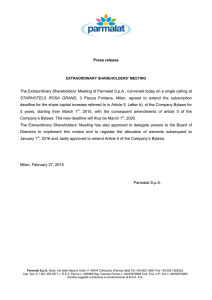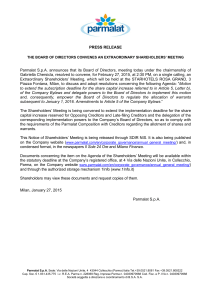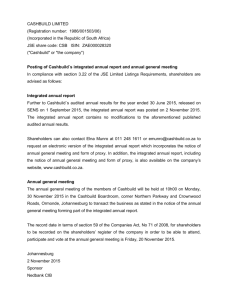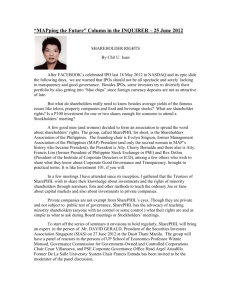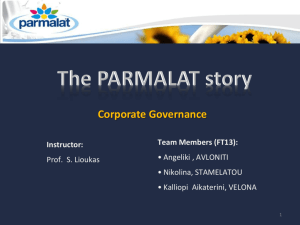CHAPTER 4 CORPORATE GOVERNANCE AROUND THE WORLD
advertisement
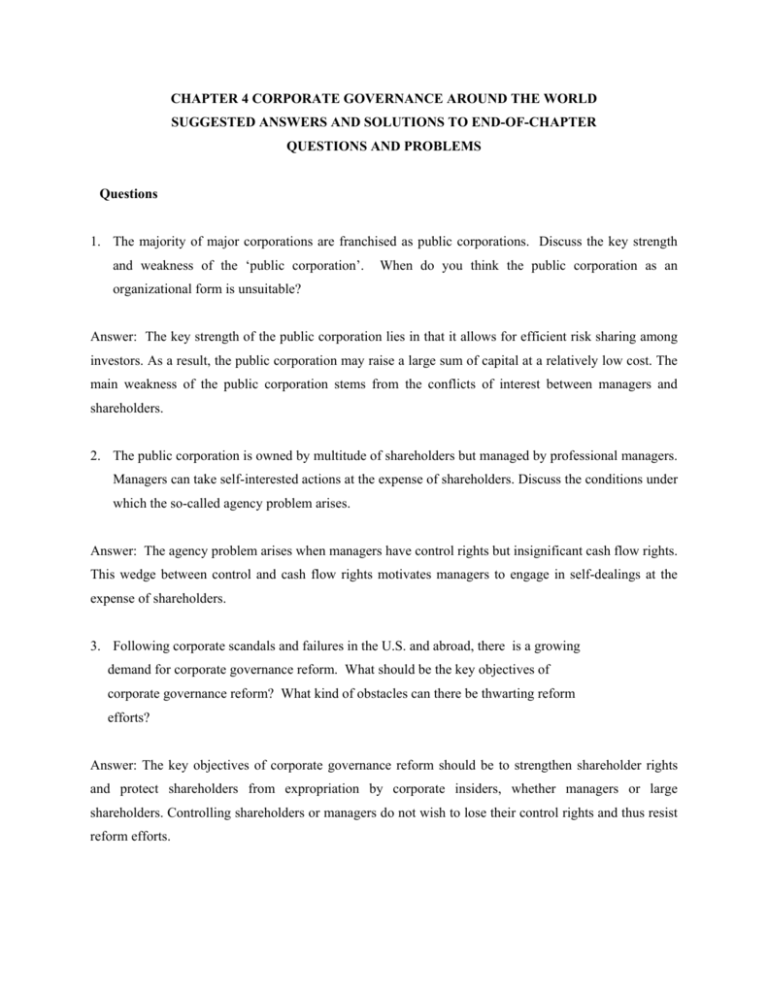
CHAPTER 4 CORPORATE GOVERNANCE AROUND THE WORLD SUGGESTED ANSWERS AND SOLUTIONS TO END-OF-CHAPTER QUESTIONS AND PROBLEMS Questions 1. The majority of major corporations are franchised as public corporations. Discuss the key strength and weakness of the ‘public corporation’. When do you think the public corporation as an organizational form is unsuitable? Answer: The key strength of the public corporation lies in that it allows for efficient risk sharing among investors. As a result, the public corporation may raise a large sum of capital at a relatively low cost. The main weakness of the public corporation stems from the conflicts of interest between managers and shareholders. 2. The public corporation is owned by multitude of shareholders but managed by professional managers. Managers can take self-interested actions at the expense of shareholders. Discuss the conditions under which the so-called agency problem arises. Answer: The agency problem arises when managers have control rights but insignificant cash flow rights. This wedge between control and cash flow rights motivates managers to engage in self-dealings at the expense of shareholders. 3. Following corporate scandals and failures in the U.S. and abroad, there is a growing demand for corporate governance reform. What should be the key objectives of corporate governance reform? What kind of obstacles can there be thwarting reform efforts? Answer: The key objectives of corporate governance reform should be to strengthen shareholder rights and protect shareholders from expropriation by corporate insiders, whether managers or large shareholders. Controlling shareholders or managers do not wish to lose their control rights and thus resist reform efforts. 4. Studies show that the legal protection of shareholder rights varies a great deal across countries. Discuss the possible reasons why the English common law tradition provides the strongest and the French civil law tradition the weakest protection of investors. Answer: In civil law countries, the state historically has played an active role in regulating economic activities and has been less protective of property rights. In England, control of the court passed from the crown to the parliament and property owners in seventeenth century. English common law thus became more protective of property owners, and this protection was extended to investors over time. 5. Explain ‘the wedge’ between the control and cash flow rights and discuss its implications for corporate governance. Answer: When there is a separation of ownership and control, managers have control rights with insignificant cash flow rights, whereas shareholders have cash flow rights but no control rights. This wedge gives rise to the conflicts of interest between managers and shareholders. The wedge is the source of the agency problem. 6. Discuss different ways that dominant investors use to establish and maintain the control of the company with relatively small investments. Answer: Dominant investors may use: (i) shares with superior voting rights, (ii) pyramidal ownership structure, and (iii) inter-firm cross-holdings. 7. The Cadbury Code of the Best Practice adopted in the United Kingdom led to a successful reform of corporate governance in the country. Explain the key requirements of the Code and discuss how it may have contributed to the success of reform. Answer: The Code requires that chairman of the board and CEO be held by two different individuals, and that there should be at least three outside board members. The recommended board structure helped to strengthen the monitoring function of the board and reduce the agency problem. 8. Many companies grant stocks or stock options to the managers. Discuss the benefits and possible costs of using this kind of incentive compensation scheme. Answer: Stock options can be useful for aligning the interest of managers with that of shareholders and reduce the wedge between managerial control rights and cash flow rights. But at the same time, stock options may induce managers to distort investment decisions and manipulate financial statements so that they can maximize their benefits in the short run. 9. It has been shown that foreign companies listed in the U.S. stock exchanges are valued more than those from the same countries that are not listed in the U.S. Explain the reasons why U.S.-listed foreign firms are valued more than those which are not. Also explain why not every foreign firm wants to list stocks in the United States. Answer: Foreign companies domiciled in countries with weak investor protection can bond themselves credibly to better investor protection by listing their stocks in U.S. exchanges that are known to provide a strong investor protection. Managers of some companies may not wish to list shares in U.S. exchanges, subjecting themselves to stringent disclosure and monitoring, for fear of losing their control rights and private benefits. 10. Explain “free cash flows.” Why do managers like to retain free cash flows instead of distributing it to shareholders? Discuss what mechanisms may be used to solve this problem? Answer: Free cash flow represents a firm’s internally generated fund in excess of the amount needed to undertake all profitable investment projects. Managers may want to keep free cash flows to undertake unprofitable projects at the expense of shareholders to benefit themselves. Having some debt can impose disciplining effect on the managers and induce them to reduce waste of firm’s resources. Minicase. Parmalat: Europe’s Enron Discussion points. 1. How was it possible for Parmalat managers to “cook the books” and hide it for so long? 2. Investigate and discuss the role that international bansks and auditors might have played in Parmalat’s collapse. 3. Study and dsicuss Italy’s corporate governance regime and its role in the failure of Parmalat. Suggested Answers: 1. Parmalat was able to cook the books mainly due to the fact that Italy has a low level of accounting transparency. 2. Clearly, international banks and auditors failed to do the due diligence, thereby indirectly contributing to the failure of Parmalat. 3. Italy has a weak corporate governance regime that does not provide a strong protection of outside shareholders. The majority of public firms are dominated by large controlling shareholders who are often the founding families. The lack of independent board of directors also contributed to the implosion of Parmalat.


